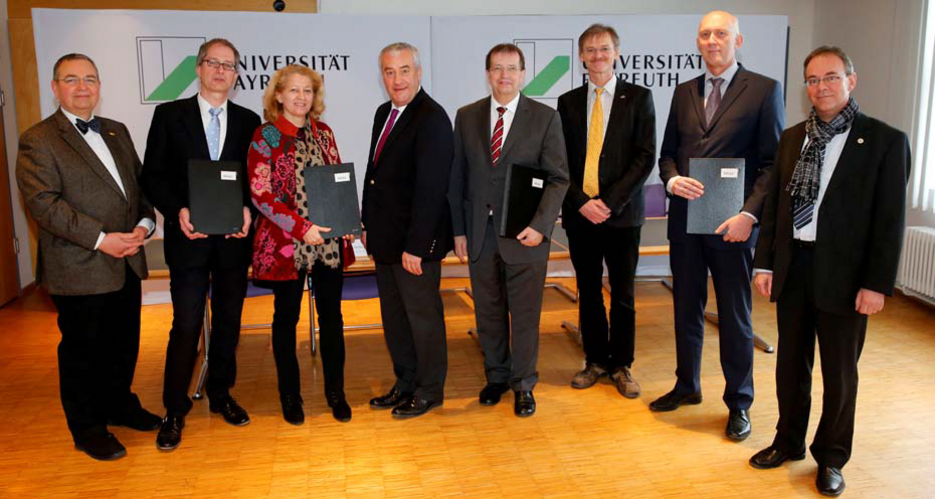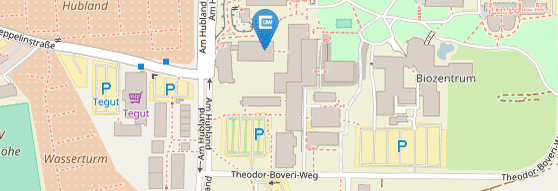Bavaria‐wide Africa initiative launched
13.02.2014Many Bavarian universities do research activities in Africa and cooperate with African partners there. In a new network, they now want to bundle their activities and to develop, link, and communicate them in public. This network was solemnly founded in Bayreuth on Thursday.

Bavarian Research Institute for African Studies (short BRIAS): This is the name of a new
network which initially consists of the University of Bayreuth, the Julius Maximilian
University of Würzburg, the Hochschule Neu‐Ulm University of Applied Sciences, and the
Ingolstadt University of Applied Sciences. But these four institutions only mark the
beginning, because BRIAS explicitly welcomes further partners from the academic scene in
Bavaria.
The initiating and leading role in the network is taken by the University of Bayreuth, which
has already a study and research center for African Studies. Moreover, there is a wellestablished
interdisciplinary research on Africa‐related subjects, in which all six faculties are
incorporated, under the roof of the Institute of African Studies.
The Bayreuth International Graduate School of African Studies, which is financed by the
Excellence Initiative of the German Federal and State Governments, is already active in its
second period of funding. Additionally, there is the Bayreuth Academy of Advanced African
Studies as well as further networks and initiatives.
System BEBUC, which presently supports
about 120 scholars at Congolese schools and universities. Bringmann initiated this program
together with his Congolese partners – in particular with Prof. Virima Mudogo, an alumnus
of chemistry in Würzburg.
Key Areas in Neu‐Ulm and Ingolstadt
The main Africa‐related focus at the Hochschule Neu‐Ulm University of Applied Sciences lies
in the field of health management. At the Ingolstadt University of Applied Sciences, research
activities concentrate on future‐oriented technologies and renewable energies.
Organization of the network
The directory board of the new network consists of nine representatives from the four
foundation members (three from Bayreuth, two each from Ingolstadt, Neu‐Ulm, and
Würzburg). The two representatives from Würzburg, Prof. Horst Beinlich (Egyptology) and
Prof. Gerhard Bringmann (Chemistry), represent the Forum Afrikazentrum and the
scholarship program BEBUC.
The cooperation contract was signed last Thursday by the presidents of the four founding
universities: the professors Stefan Leible (Bayreuth), Alfred Forchel (Würzburg), Walter
Schober (Ingolstadt), and Uta Feser (Neu‐Ulm). As representatives of the BRIAS directory
board, the professors Dymitr Ibriszimow (Bayreuth), Gerhard Bringmann (Würzburg), and
Wilfried Zörner (Ingolstadt) were present.
Minister curious about results
The Bavarian Minister of Education and Scientific Affairs, Ludwig Spaenle, was also present
during the signing of the contract: “In the Bavarian Research Institute for African Studies, the
competences of Bavarian scientists concerning questions all about the African continent are
brought together”, the Minister explains. The close collaboration of the four universities in
this field will generate new questions and projects: “I am curious about the results!”
Contact
Prof. Dr. Dr. h.c. mult Gerhard Bringmann, Institute of Organic Chemistry at the University of
Würzburg, T. +49 (0)931 31‐85323, bringman@chemie.uni‐wuerzburg.de
Prof. Dr. Horst Beinlich, Faculty of Philosophy I (Egyptology) at the University of Würzburg,
T. +49 (0)931 99 17 91 27, horst.beinlich@uni‐wuerzburg.de


